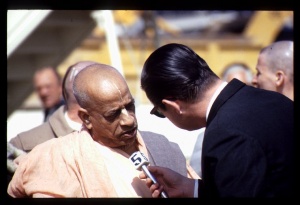CC Madhya 20.237: Difference between revisions
m (1 revision(s)) |
No edit summary |
||
| Line 1: | Line 1: | ||
{{ | [[Category:Sri Caitanya-caritamrta - Madhya-lila Chapter 20|C237]] | ||
<div style="float:left">'''[[Sri Caitanya-caritamrta|Śrī Caitanya-caritāmṛta]] - [[CC Madhya|Madhya-līlā]] - [[CC Madhya 20|Chapter 20: Lord Śrī Caitanya Mahāprabhu Instructs Sanātana Gosvāmī in the Science of the Absolute Truth]]'''</div> | |||
<div style="float:right">[[File:Go-previous.png|link=CC Madhya 20.236|Madhya-līlā 20.236]] '''[[CC Madhya 20.236|Madhya-līlā 20.236]] - [[CC Madhya 20.238|Madhya-līlā 20.238]]''' [[File:Go-next.png|link=CC Madhya 20.238|Madhya-līlā 20.238]]</div> | |||
{{CompareVersions|CC|Madhya 20.237|CC 1975|CC 1996}} | |||
{{RandomImage}} | |||
==== TEXT 237 ==== | ==== TEXT 237 ==== | ||
<div | <div class="verse"> | ||
hayaśīrṣa-pañcarātre kahe ṣola-jana | :hayaśīrṣa-pañcarātre kahe ṣola-jana | ||
tāra mate kahi ebe cakrādi-dhāraṇa | :tāra mate kahi ebe cakrādi-dhāraṇa | ||
</div> | </div> | ||
| Line 12: | Line 16: | ||
==== SYNONYMS ==== | ==== SYNONYMS ==== | ||
<div | <div class="synonyms"> | ||
hayaśīrṣa- | ''hayaśīrṣa-pañcarātre''—the revealed scripture named the ''Hayaśīrṣa-pañcarātra''; ''kahe''—says; ''ṣola-jana''—sixteen personalities; ''tāra mate''—according to this opinion; ''kahi''—I shall describe; ''ebe''—now; ''cakra-ādi-dhāraṇa''—the holding of weapons, beginning with the disc. | ||
</div> | </div> | ||
| Line 19: | Line 23: | ||
==== TRANSLATION ==== | ==== TRANSLATION ==== | ||
<div | <div class="translation"> | ||
“According to the Hayaśīrṣa-pañcarātra, there are sixteen personalities. I shall now describe that opinion of how They hold the weapons. | “According to the Hayaśīrṣa-pañcarātra, there are sixteen personalities. I shall now describe that opinion of how They hold the weapons. | ||
</div> | </div> | ||
| Line 26: | Line 30: | ||
==== PURPORT ==== | ==== PURPORT ==== | ||
<div | <div class="purport"> | ||
The sixteen personalities are as follows: (1) Vāsudeva, (2) Saṅkarṣaṇa, (3) Pradyumna, (4) Aniruddha, (5) Keśava, (6) Nārāyaṇa, (7) Mādhava, (8) Govinda, (9) Viṣṇu, (10) Madhusūdana, (11) Trivikrama, (12) Vāmana, (13) Śrīdhara, (14) Hṛṣīkeśa, (15) Padmanābha and (16) Dāmodara. | The sixteen personalities are as follows: (1) Vāsudeva, (2) Saṅkarṣaṇa, (3) Pradyumna, (4) Aniruddha, (5) Keśava, (6) Nārāyaṇa, (7) Mādhava, (8) Govinda, (9) Viṣṇu, (10) Madhusūdana, (11) Trivikrama, (12) Vāmana, (13) Śrīdhara, (14) Hṛṣīkeśa, (15) Padmanābha and (16) Dāmodara. | ||
</div> | </div> | ||
__NOTOC__ | |||
<div style="float:right; clear:both;">[[File:Go-previous.png|link=CC Madhya 20.236|Madhya-līlā 20.236]] '''[[CC Madhya 20.236|Madhya-līlā 20.236]] - [[CC Madhya 20.238|Madhya-līlā 20.238]]''' [[File:Go-next.png|link=CC Madhya 20.238|Madhya-līlā 20.238]]</div> | |||
__NOTOC__ | |||
__NOEDITSECTION__ | |||
Revision as of 08:06, 7 September 2021

A.C. Bhaktivedanta Swami Prabhupada
TEXT 237
- hayaśīrṣa-pañcarātre kahe ṣola-jana
- tāra mate kahi ebe cakrādi-dhāraṇa
SYNONYMS
hayaśīrṣa-pañcarātre—the revealed scripture named the Hayaśīrṣa-pañcarātra; kahe—says; ṣola-jana—sixteen personalities; tāra mate—according to this opinion; kahi—I shall describe; ebe—now; cakra-ādi-dhāraṇa—the holding of weapons, beginning with the disc.
TRANSLATION
“According to the Hayaśīrṣa-pañcarātra, there are sixteen personalities. I shall now describe that opinion of how They hold the weapons.
PURPORT
The sixteen personalities are as follows: (1) Vāsudeva, (2) Saṅkarṣaṇa, (3) Pradyumna, (4) Aniruddha, (5) Keśava, (6) Nārāyaṇa, (7) Mādhava, (8) Govinda, (9) Viṣṇu, (10) Madhusūdana, (11) Trivikrama, (12) Vāmana, (13) Śrīdhara, (14) Hṛṣīkeśa, (15) Padmanābha and (16) Dāmodara.